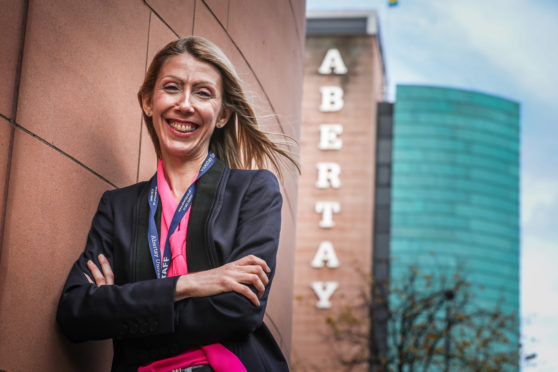With anxiety around the coronavirus pandemic on the rise, Dundee-based past chair of the British Psychological Society Professor Zoe Chouliara tells Michael Alexander why more has to be done to prevent a growing Covid-19 related mental health time bomb.
One of the UK’s leading mental health practitioners has expressed “grave concerns” about the impact coronavirus isolation and social distancing could have on the mental state of vulnerable people across Britain – especially in the Dundee area.
Zoe Chouliara, who is Professor of Mental Health at Abertay University in Dundee, said she is particularly worried about people who have pre-existing psychological issues, multiple comorbidities, the elderly and those living in poverty.
The counselling psychologist, who runs a frontline psychological clinic at Ninewells Hospital for people with severe and complex mental health issues, said these groups are likely to suffer the greatest impact that could potentially lead to further morbidity and mortality.
The past chairperson of the British Psychological Society also fears suicides could increase, divorce rates could rocket and domestic abuse could become more prevalent unless there is a greater emphasis on mental health awareness and issue prevention.
“I feel as a professional we should be getting out some messages on how people can cope and protect their mental health as much as possible under these novel and challenging circumstances,” she told The Courier.
“This should be done whilst people are still following the crucial public health guidance.
“We need to act promptly before the issues become too big to manage.
“We have already noticed that anxious patients are getting more anxious, depressed patients are getting more depressed. We are also worrying obviously about the risk of suicide among vulnerable people.
“Also because the event is so sudden with a high degree of uncertainty, there’s an element of mass dramatization about what’s happening. I detect an increasing level of worrying as the weeks go by.”
Professor Chouliara, who was last year named in Universities UK’s top 100 list of the Nation’s Lifesavers, pioneered an internationally ground-breaking self-help resource for survivors of childhood abuse.
She was the lead author on the ‘Acts of Recovery’ booklet, the world’s first research-based and survivor-centred resource, which is used in clinical services in the UK, Australia and India.
Now she hopes her person-centred approach to dealing with mental health adversity can make a positive difference in these unprecedented coronavirus times.
Professor Chouliara said her clinic at Ninewells had been suspended for staffing reasons and to limit face-to-face contact during the coronavirus crisis.
But she is continuing to work with clients remotely and would be “keeping an eye on” some of the most vulnerable including those at higher risk of suicide, self-harm and higher levels of distress.
Domestically, she said she was also getting enquiries from people who are having relationship issues as couples. The pressures of self-isolating indefinitely could put unprecedented strain on already fractured relationships.
“A lawyer told me last week they are anticipating higher divorce rates – and I wouldn’t be surprised!” she said.
“I’m not saying the coronavirus situation is going to cause divorce, but for relationships that were shaky already – because of the fact that people have to co-exist in a small space for long periods of time, this can make conflicts worse.
“Then we have children who are being home schooled and the issue of children who are only children and don’t have any other siblings at home.
“This is good and bad – they get more attention perhaps but they don’t share the company of peers. That’s where parents can allow interaction with other children, their friends, on Skype so they don’t feel so stressed.”
Prevention is key and Professor Chouliara said she was keen to promote positivity and give ideas to stop anxiety “getting out of hand”.
“We have to preserve peoples’ hope, positivity and energise their own personal resources of dealing with the crisis,” she said.
“This is to prevent people getting distressed and people who are distressed from becoming more distressed. This is especially important in areas like Dundee where we have a high level of poverty and deprivation and mental health issues closely related to the social aspects.”
Language needed to be firm but not “catastrophizing”, she said.
People who can should go out and exercise once a day in line with government guidance. People who can’t get out should try and stay mobile in their homes.
For anybody with mood problems and depression, being sedentary for long periods is dangerous because their mood can go even lower along with their immune system which can be a “vicious circle”.
A brief walk or time in the garden all helps improve mood, sleep and appetite. People need to eat and drink as healthily as they can because physical and mental health go together.
Other recommended forms of relaxation were cooking, music, watching comedy and manual “distractions” like knitting.
She also suggested people with anxiety or OCD should limit their internet use and only look at ‘official’ news websites.
Keeping connected with family and friends – even from a distance over the phone – was also vital. Again these conversations should not “catastrophize” but focus on the positive.
“We need to fill our bodies with positive food, but we also need a diet of positive emotions,” she said.
“I’m not saying negative emotions are bad, but staying in a negative state for too long is not going to be helpful.”





